Pepper and peppercorn are not the same. Peppercorn is the whole, dried berry from the Piper nigrum plant, while pepper is the ground form of peppercorn. In this guide, we'll break down the key differences, including flavor, usage, and when to use each for the best results in your cooking.
Table of Contents
- What Exactly Is Pepper?
- And What About Peppercorn?
- Pepper vs Peppercorn: Head-to-Head Comparison
- Practical Tips: When to Use Each
- The Flavor Breakdown
- Buying Guide: Choosing Quality Spices
- Frequently Asked Questions
- Spice Up Your Kitchen – Final Thoughts
What Exactly Is Pepper?
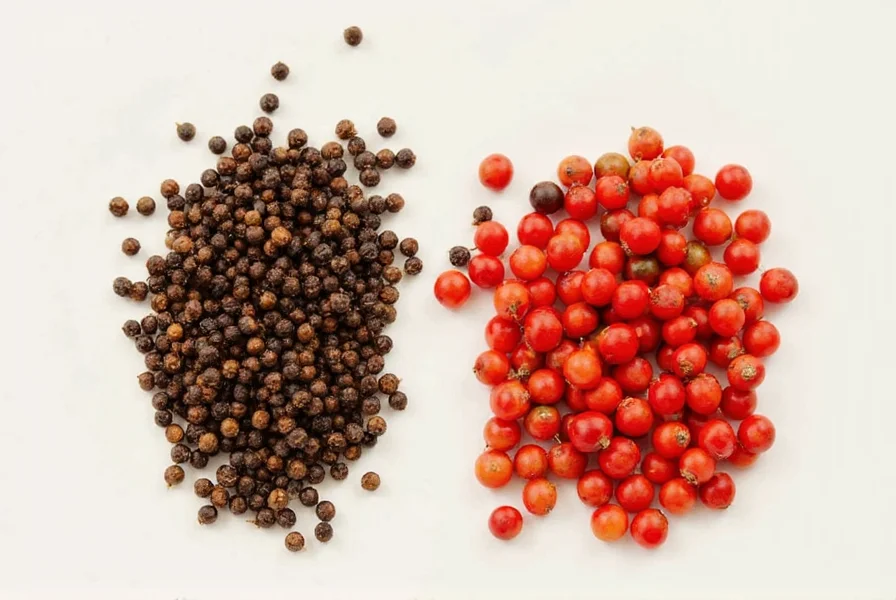
When most people say "pepper," they're referring to the fine powder that comes in shakers and grinders on dining tables across the globe. This is ground black pepper — made by grinding dried black peppercorns into a fine, aromatic powder.
Ground pepper is incredibly versatile and has been a pantry staple for centuries. It adds a subtle heat and earthy sharpness to dishes and is often used as a finishing touch or blended into spice mixes, marinades, and sauces.
Types of Ground Pepper
- Black Pepper: Most common type, with bold, pungent flavor.
- White Pepper: Made from mature peppercorns with the outer husk removed; milder and slightly fermented taste.
- Green Pepper: Young peppercorns, usually freeze-dried or pickled; more vegetal and less spicy.
- Pink Peppercorn: Technically not a true peppercorn, but from a different plant (Schinus molle); sweet and fruity, often used decoratively.
And What About Peppercorn?
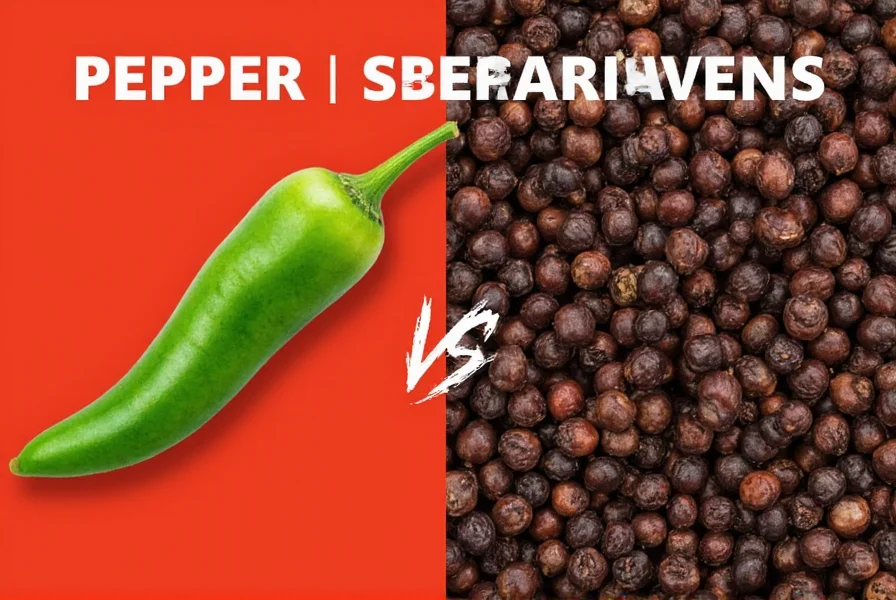
Peppercorns are the whole, unground berries from the Piper nigrum plant — the very same ones used to make black pepper powder. But when left whole, they retain a more intense, complex flavor profile.
Chefs love using peppercorns in marinades, soups, stews, and sauces where slow cooking allows their full aroma and heat to develop. They also make an appearance in classic dishes like steak au poivre or crushed into compound butters.
Common Types of Peppercorns
- Black Peppercorn: Dried green peppercorn; strongest and most commonly used.
- Green Peppercorn: Unripe, often preserved in brine or freeze-dried; mild and fresh tasting.
- White Peppercorn: Ripe peppercorn with the skin removed; smoother, earthier flavor.
- Red Peppercorn: Fully ripe, rarely found; sweet-spicy notes, often freeze-dried for use in gourmet dishes.
Pepper vs Peppercorn: Head-to-Head Comparison
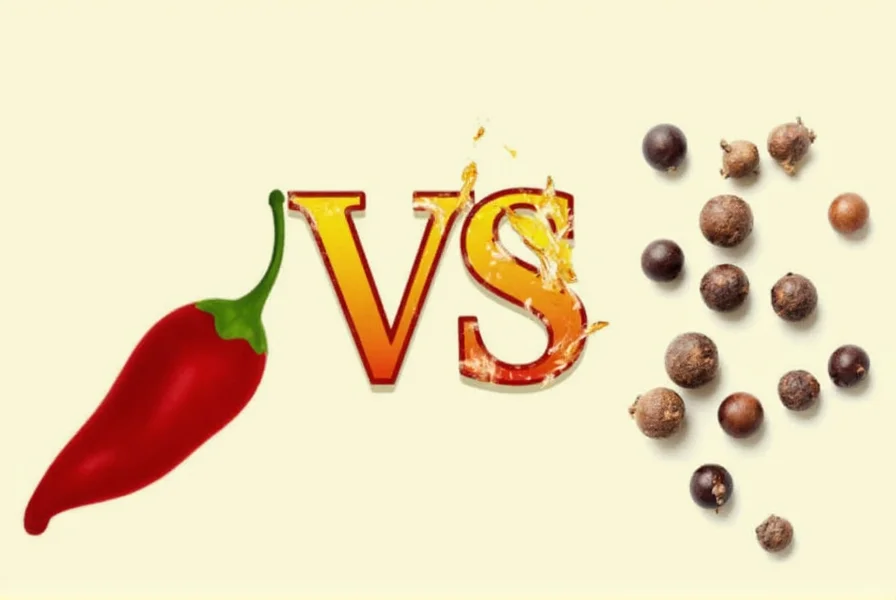
| Feature | Pepper (Ground) | Peppercorn (Whole) |
|---|---|---|
| Form | Fine powder | Whole dried berries |
| Flavor Intensity | Mild to moderate | Stronger, more aromatic |
| Shelf Life | Shorter due to oxidation | Longer; retains freshness better |
| Usage | Seasoning during or after cooking | Cooking from scratch, infusions, sauces |
| Convenience | Ready to use | Requires grinding or crushing |
| Versatility | Very high | Great for gourmet recipes |
Practical Tips: When to Use Each
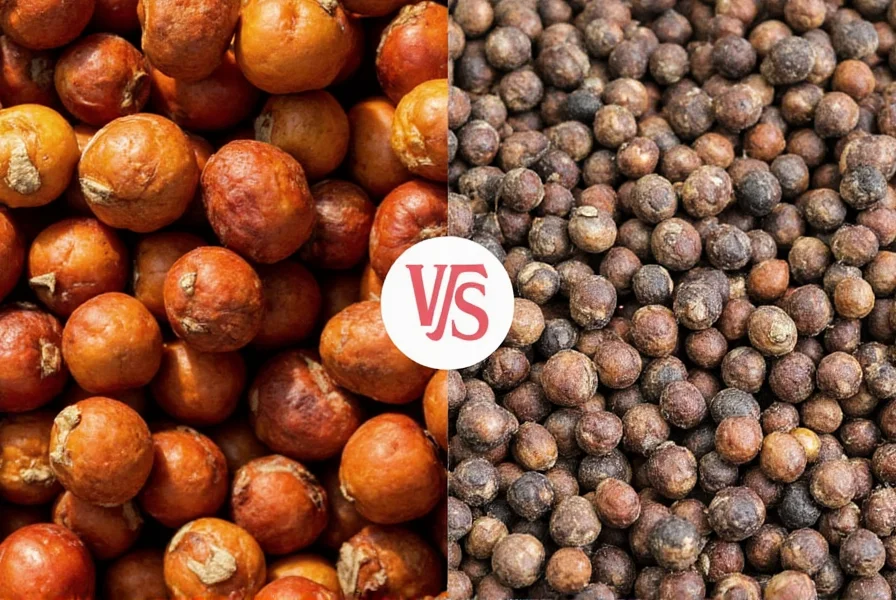
Here's a handy list of situations where each type shines brightest:
- Use ground pepper when:
- You want quick seasoning with even distribution.
- You're adding it at the end of cooking for a final kick.
- You're blending into rubs, dressings, or marinades.
- You prefer convenience and don't want to grind peppercorns every time.
- Use whole peppercorns when:
- You're making stocks, soups, or sauces that simmer for a while.
- You want to create a coarser texture or visual appeal in dishes.
- You're preparing gourmet recipes like steak au poivre or homemade mustards.
- You enjoy freshly cracked pepper with maximum aroma and flavor.
The Flavor Breakdown

The reason many chefs swear by whole peppercorns over pre-ground pepper is simple: **flavor retention**. Once ground, pepper begins to lose its potency due to exposure to air. Whole peppercorns preserve their volatile oils, which means more punch per pinch when you grind them yourself.
Key Flavor Compounds
- Piperine: The primary alkaloid responsible for pepper's signature heat and pungency.
- Monoterpenes: Volatile compounds that contribute to aroma and floral notes, especially in fresh peppercorns.
- Sesquiterpenes: Earthier, more complex flavors that come out when peppercorns are gently heated or toasted before grinding.
Buying Guide: Choosing Quality Spices
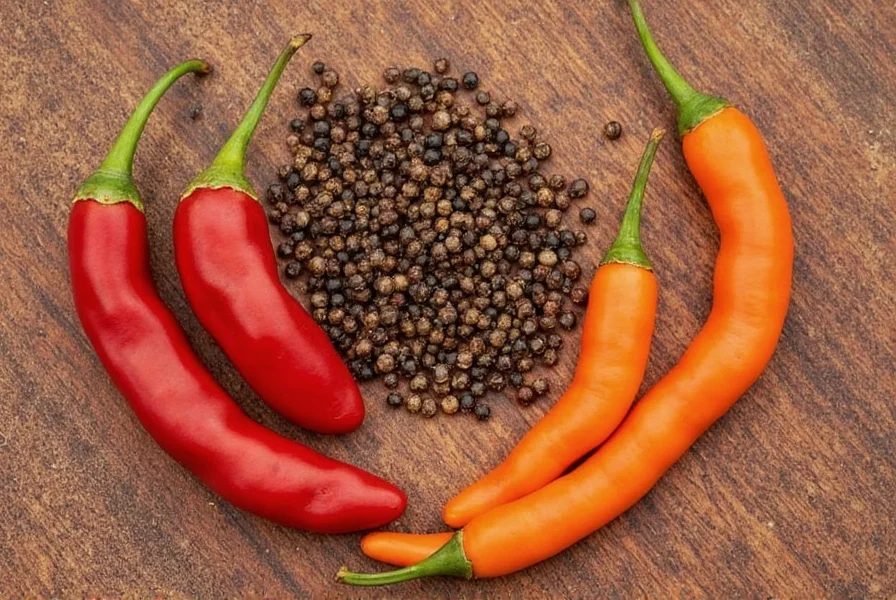
Whether you're picking up ground pepper or whole peppercorns, quality matters. Here's how to spot the best spices:
For Ground Pepper
- Look for dark, rich color — lighter hues suggest old stock.
- Aroma should be strong and sharp when opened.
- Avoid products labeled "seasoned" or "enhanced" unless you know what's added.
- Buy smaller containers if you don't cook frequently to ensure freshness.
For Whole Peppercorns
- Choose firm, heavy peppercorns — light or hollow ones indicate age and loss of flavor.
- Check for uniform size and minimal debris in the packaging.
- Darker peppercorns (black) tend to be more aromatic than white or green.
- Opt for vacuum-sealed or glass jars to protect from moisture and light.
Recommended Brands & Products
| Product Name | Type | Features | Best For |
|---|---|---|---|
| The Spice Lab Black Peppercorns | Whole | Organic, sustainably sourced, strong aroma | Gourmet cooking, steak lovers |
| Simply Organic Ground Black Pepper | Ground | USDA certified organic, robust flavor | Daily cooking, home use |
| Penzeys Tellicherry Peppercorns | Whole | Larger size, bold flavor, premium quality | Marinades, sauces, gifting |
| McCormick Black Pepper | Ground | Widely available, consistent taste | Kitchen basics, family meals |
| Rajbhog Pink Peppercorns | Whole (Non-Piper nigrum) | Unique sweet-spicy flavor, decorative use | Plating, cocktails, desserts |
Frequently Asked Questions

Are pepper and peppercorn the same thing?
Peppercorns are the whole, dried berries of the Piper nigrum plant, while pepper refers to the ground form of these berries. So they come from the same source but are in different forms. Think of peppercorns as the raw ingredient and pepper as the processed version.
Which is stronger, pepper or peppercorn?
Whole peppercorns have a stronger, more complex flavor because they retain their essential oils better. Ground pepper loses potency more quickly due to oxidation. When you grind peppercorns fresh, you get the maximum flavor and heat.
Can I substitute ground pepper for whole peppercorns in recipes?
Yes, but with some considerations. As a general rule, 1/4 teaspoon of freshly ground pepper equals about 1/2 teaspoon of pre-ground pepper. For recipes where peppercorns are meant to be strained out (like in stocks), you shouldn't substitute ground pepper as it will make the liquid gritty.
Why does freshly ground pepper taste better than pre-ground?
Peppercorns contain volatile oils that give pepper its distinctive aroma and flavor. These oils begin to dissipate as soon as the peppercorn is ground. Pre-ground pepper has already lost much of these oils through exposure to air, resulting in a less vibrant flavor.
How long do ground pepper and whole peppercorns last?
Whole peppercorns can stay fresh for 2-3 years when stored properly in an airtight container away from light and moisture. Ground pepper, however, starts losing its potency within 4-6 months. For best flavor, buy whole peppercorns and grind them as needed.
What's the difference between black, white, green, and pink peppercorns?
Black peppercorns are dried unripe berries, white are ripe berries with the outer layer removed, green are unripe berries preserved, and pink peppercorns aren't true peppercorns at all—they come from a different plant (Schinus molle) and have a sweet, floral flavor. Each offers unique flavor profiles and culinary uses.
Can I grind peppercorns in a coffee grinder?
Yes, but it's best to use a dedicated grinder for spices to avoid flavor transfer. If using a coffee grinder, make sure to clean it thoroughly before and after to prevent your coffee from tasting like pepper (and vice versa). A dedicated pepper mill is ideal for regular use.
Are pink peppercorns really peppercorns?
No, pink peppercorns are not true peppercorns. They come from the Brazilian pepper tree (Schinus molle) or the Peruvian pepper tree (Schinus molle), which is unrelated to the Piper nigrum plant that produces black, white, and green peppercorns. They have a different flavor profile—more sweet and floral with less heat.
Spice Up Your Kitchen – Final Thoughts
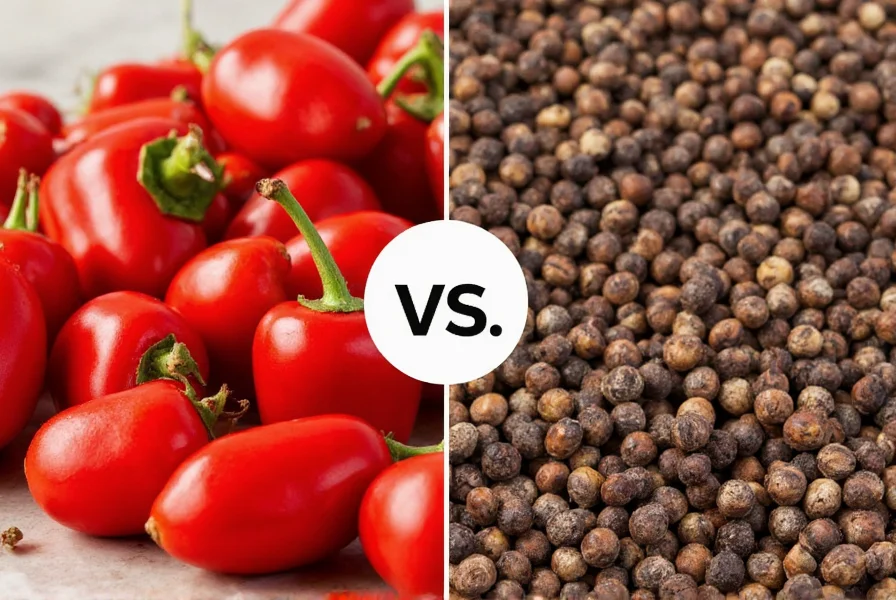
So, is pepper the same as peppercorn? Not quite. While they come from the same source, their forms, flavors, and uses differ significantly. Understanding the distinction helps you make smarter choices in the kitchen — whether you're looking for a gentle seasoning boost or an aromatic punch.
By now, you should feel confident about when to reach for ground pepper versus whole peppercorns. And remember, fresh is always better — especially when it comes to unlocking those complex, vibrant flavors that elevate your cooking from good to unforgettable.
Next time someone asks you the question, "Is pepper the same as peppercorn?" you'll have all the answers — plus a few delicious tricks up your sleeve!

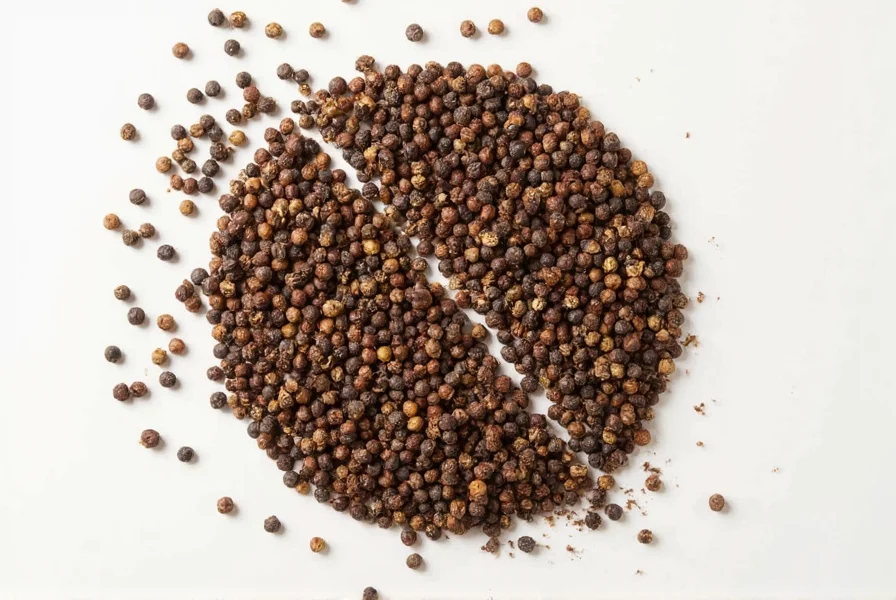









 浙公网安备
33010002000092号
浙公网安备
33010002000092号 浙B2-20120091-4
浙B2-20120091-4